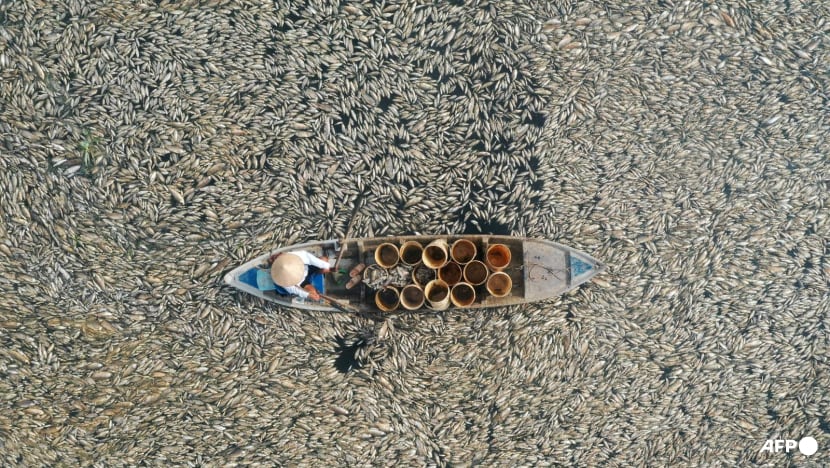Again, they blame ‘climate change’ even if this devastating fish mass die-off is clearly due to a bad reservoir/ water management…

Hundreds of thousands of fish have died in a reservoir in southern Vietnam’s Dong Nai province, with locals and media reports suggesting a brutal heatwave and the lake’s management are to blame.
Like much of Southeast Asia – where schools have recently been forced to close early and electricity usage has surged – southern and central Vietnam have been scorched by devastating heat.
“All the fish in the Song May reservoir died for lack of water,” a local resident in Trang Bom district, who identified himself only as Nghia, told AFP.
“Our life has been turned upside down over the past 10 days because of the smell.”
Pictures show residents wading and boating through the 300ha Song May reservoir, with the water barely visible under a blanket of dead marine life.
According to media reports, the area has seen no rain for weeks and the water in the reservoir is too low for the creatures to survive.
Reservoir management had previously discharged water to try to save crops downstream, Nghia said.
“They then tried to renovate the reservoir, bringing in a pump to take the mud out so that the fish would have more space and water,” he said.
However, the efforts did not work and, shortly afterwards, many of the fish died, with local media reports suggesting as many as two hundred tonnes’ worth of fish may have perished.
Tuoi Tre newspaper reported that the firm in charge of managing the lake had begun dredging in early 2024, initially planning to release extra water into the reservoir for the fish.
“But owing to an unrelenting heatwave, the investor released the water into the downstream area, leading to the water level going down. As a result, fish died en masse,” the newspaper reported.

The reservoir is the water source for crops in Trang Bom and Vinh Cuu districts of Dong Nai province.
Authorities are investigating the incident while working to quickly remove the dead fish.
“We hope authorities will do their best to improve the situation,” Nghia said.
SOUTHEAST ASIA BAKES
According to weather forecasters, temperatures in Dong Nai province, 100km west of Ho Chi Minh City, reached around 40 degrees Celsius in April, breaking the record high temperature recorded in 1998.
The soaring temperatures are also impacting neighbouring Cambodia, where the high could reach 43 on the mercury.
On Wednesday (May 1) Cambodian Prime Minister Hun Manet ordered schools to consider closing to protect teachers and students from the heat and put officials on stand-by in case of water shortages.
It follows the education minister on Tuesday ordering establishments to shorten morning classes and delay afternoon ones in an attempt to avoid the worst of the midday heat.
Hang Chuon Naron said the measures were “to prevent risks and to avoid illnesses that would harm the health” of students and teachers.
Meanwhile, in Thailand, electricity usage surged to new records on Tuesday as temperatures in northeastern province Udon Thani broke 44 degrees Celsius.
WHY IS HEAT HEALTH RESEARCH SO IMPORTANT?
Heat-related research is crucial for the region, said Ms Lydia Law, co-director of the Heat Resilience and Performance Centre at the National University of Singapore’s Yong Loo Lin School of Medicine.
“It is time we take a stand and further our research in this area, so that we can continue to help everyone in this region to live and work in the heat.”
She told CNA’s Asia Now on Thursday that extreme heat can affect all segments of society, and governments across the region can develop more targeted strategies to mitigate the effects.
“With the recent increases in temperatures as well as frequency of these extreme weather patterns, there’s definitely more focus and attention on not only understanding the phenomenon, but also the impacts that extreme heat has both directly and indirectly,” she added.
She said governments can also help facilitate ground-up efforts to tackle this complex challenge.
“We are already susceptible to this syndrome called the ‘boiling frog syndrome’. This is where we just adapt and we adjust, because heat is not entirely new to us,” said Ms Law, referring to a metaphor that illustrates how small and gradual changes in the environment can have a cumulative effect.
“We’ve been living with it, but then because we are used to it, we take little or no action to mitigate the situation until sometimes it might get too late and that’s what we want to avoid.” [CNA]
Hey friends, it’s time to wake up!
If a few more people choose to support my work, I could expose more lies, root out more corruption, and call out more hypocrites. So, if you can afford it, please support my endeavor by either using PAYPAL or the DonorBox below (PAYPAL & Credit Cards / Debit Cards accepted)…
If you are a crypto fanatic, I do now accept crypto donations:
BTC: 1AjhUJM6cy8yr2UrT67iGYWLQNmhr3cHef (Network: Bitcoin) USDT: 0x490fe5d79d044a11c66c013e5b71305af0a76c1b (Network: Etherum ERC20)
You should join my newsletter to get a daily compilation of different breaking news, pictures and videos… YOU WILL LOVE IT!
Thank you,
Manuel













The dead fish could be scooped up and used for fertilizer.Solves two problems at once.
No matter where the rise in heat comes from it can be combated by shifting schedules around.Schools open from two hours prior to sunset to two hours after sunrise
Companies if possible could do the same.Even construction companies might be able to pull this off.Using spotlights to work at night.Obviously not all projects are
appropriate for this.
Geothermal cooling for fish farms also could work.Would need a way though that was independent of dams reservoirs
Perhaps a sluice diversion both intake and discharge.That way they could take advantage of the water source without being dependent apun it.
This could work in a lot of countries not just Laos cambodia.